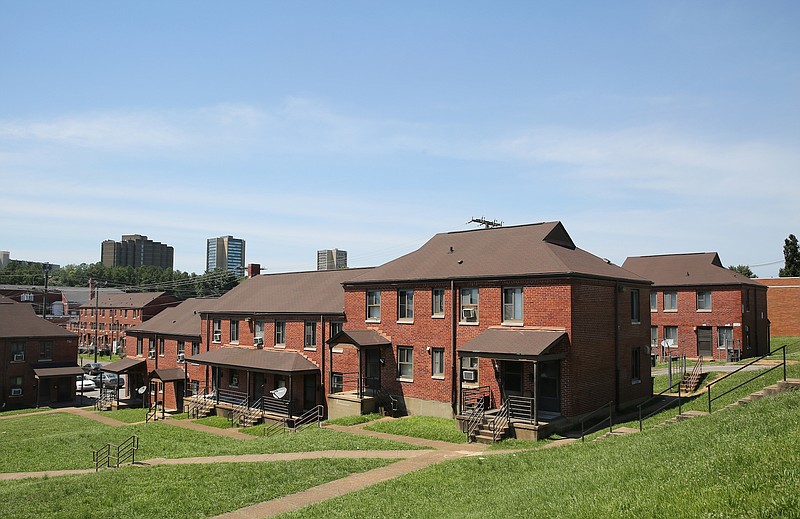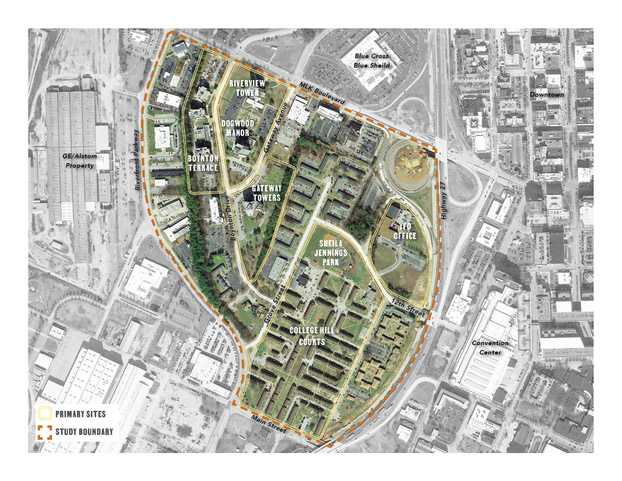Chattanooga's oldest and biggest public housing complex will get a new look as the Chattanooga Housing Authority seeks ways to maintain and grow both affordable and mixed-used housing and commercial development on the Westside of Chattanooga's downtown.
The authority is launching the next phase in its nine-month study with a series of public meetings to re-imagine the 120 acres that are home to more than 2,000 residents who live in subsidized housing at College Hill Courts and the neighboring Boynton Terrace Apartments, Gateway Towers, Dogwood Manor, Ridgeway, Golden Gateway, Boynton Overlook and Riverview Apartments.
"This is an area that has a lot of challenges, but at the same time it has a lot of strengths," said Rhae Parkes of EJP Consulting Group, the Florida consulting firm that is working with the city, residents and other stakeholders to develop the "Westside Evolves" plan for the future. "This a neighborhood that is affordable; it has a deep and rich history as an African American community, and it is a community that has an incredible location close to downtown and adjacent to a vibrant and increasingly growing riverfront area."
College Hill Courts, the 497-unit apartment complex that opened in 1940, would require $60 million of repairs and upgrades to meet today's Housing and Urban Development standards, and the nearby Gateway Towers is also in need of rehabilitation.
"We know we cannot sustain this property long into the future," said Betsy McCright, executive director of the Chattanooga Housing Authority. "So we want to discuss what might be next for this neighborhood."
Although the housing authority previously demolished the Spencer McCallie Homes in 2003, the Maurice Poss Homes in 2005 and the Harriet Tubman housing development. in 2012, officials have committed to maintaining both the number of affordable housing units in the area and the historic nature of one of Chattanooga's oldest traditionally African American communities. McCright said planners are eager to get public input and ideas about the future direction for the area to both preserve affordable housing options and provide more economic and retail opportunities for Westside residents.
Westside Evolves planning meetings
The community meeting will be in person at the Gateway Community Room or the Dogwood Manor Community Room or may be accessed via telephone at (301) 715-8592 (meeting ID 948 2729 6619) or on Zoom at WestsideEvolves.com/updates.Discussion of buildings, places and connections:* Saturday, March 6 from 10 a.m to noon* Tuesday, March 9 from 11:30 a.m. to 1:30 p.m.* Thursday, March 11 from noon to 2 p.m.Discussion of People, Services and Opportunities:* Monday, March 8 from 2:30-4:30 p.m.* Saturday, March 13 from 10 a.m. to noon* Monday, March 15 from 4-6 p.m
The study area encompasses the area between U.S. 27, Riverfront Parkway, M.L. King Boulevard and Main Street, which has undergone numerous redevelopments as Highway 27 was built through downtown and other urban renewal projects reshaped the region.
"We are focused not just on the physical attributes of the neighborhood but also ensuring that the plan itself focuses intentionally on the people who live in this neighborhood and making sure there is support for families," Parkes said. "We will be looking to develop a mixed-income community that introduces a range of housing options."
Currently, the entire area is comprised of subsidized housing and the median household income in the area is about $12,000 a year, or about one-fourth of the median income for all of Chattanooga, according to a new report on the Westside. Many lack internet access, and students who live in the Westside are more apt to suffer from high absenteeism in school and lower achievement than their peers from other areas of the city.
The biggest concern among residents surveyed in the area as a part of the study relates to concerns over crime.
"Crime, violence and vandalism were the top things that residents told us they do not like about living on the Westside, and this perception of crime appears to be aligned with reality," said Kathy Carton of the EJP Consulting Group. "The violent crime rate in the Westside is two times that in the city as a whole."
Currently, the nearest full-service grocery store is 3 miles away from College Hill Courts, although a new Food City is being proposed at South Broad Street and Main Street.
City planners said they hope to bring more community services and amenities, including stores and other commercial businesses to serve local residents and create economic opportunities for the city. The area around the subsidized housing is undergoing major redevelopment with plans for billions of dollars of potential projects at the former Alstom site and the Cameron Harbor housing developments being built along the Tennessee River.
"This particular place in our city holds significant potential opportunity for residents who require access to jobs, education and services," McCright said.
Chattanooga Design Studio engaged EJP, based in Orlando, to facilitate the planning process, which will ask residents and others to imagine the future of the district. The planners are taking input in a variety of ways, including artistic drawings from some residents surveyed in the past year.
EJP has scheduled a half dozen workshops in the next two weeks that will include exercises and conversations they hope will begin to shape a shared vision for the area. The forums, which will be offered both in person in the area and online, will include discussions about priorities and preferences regarding new housing, neighborhood retail and amenities, transportation, public infrastructure and supportive service programs.
For the first workshop, titled "Buildings, Places & Connections," the public is invited to share priorities and preferences regarding the built environment, which includes new housing, neighborhood retail and amenities, transportation, public infrastructure, parks and other open spaces in the neighborhood.
During the second workshop, titled "People, Services & Opportunities," the public is invited to share priorities and preferences for essential services and supportive programs needed to help Westside residents and their families improve their health and wellness, income and employment, education and overall quality of life.
For more information, visit WestsideEvolves.com.
Contact Dave Flessner at dflessner@timesfreepress.com or at 423-757-6340.

